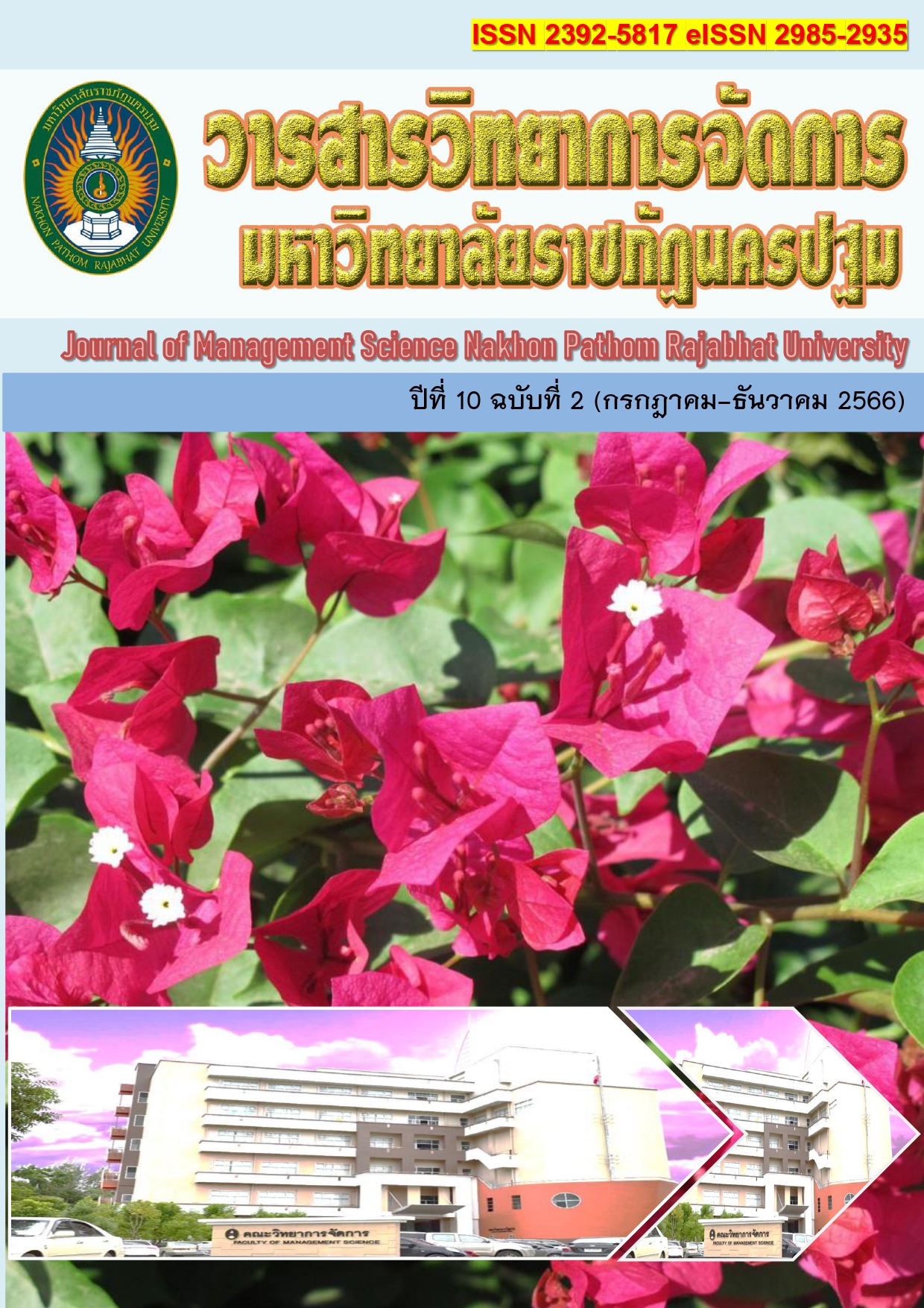อิทธิพลการตลาดผ่านทางประสาทสัมผัสต่อพฤติกรรมการบริโภคกาแฟแบรนด์เนม
Main Article Content
บทคัดย่อ
การวิจัยนี้มีวัตถุประสงค์ 1) เพื่อระบุปัจจัยการตลาดผ่านทางประสาทสัมผัสที่มีผลต่อพฤติกรรมการบริโภคกาแฟแบรนด์เนม และ 2) เพื่อตรวจสอบอิทธิพลโดยรวมของแรงจูงใจต่อพฤติกรรมการบริโภคกาแฟ แบรนด์เนม โดยมีกรอบแนวคิดของงานวิจัยประยุกต์จากการตลาดผ่านทางประสาทสัมผัส แรงจูงใจในการบริโภคกาแฟแบรนด์เนมเก็บข้อมูลด้วยวิธีการเลือกตัวอย่างแบบสะดวกจำนวน 804 คน วิเคราะห์ข้อมูลด้วยการวิเคราะห์สองตัวแปร และแบบจำลองสมการโครงสร้าง
ผลการวิจัย พบว่าการศึกษานี้ระบุถึงความสำคัญของปัจจัยการตลาดผ่านทางประสาทสัมผัสทั้งห้าของร้านกาแฟแบรนด์เนมภาพรวมพบว่าประสาทสัมผัสทั้งห้าส่งผลต่อความโดดเด่นของร้านกาแฟมีผลต่อพฤติกรรมการบริโภค การสัมผัสทางกลิ่น ทางเสียงจะส่งผลต่อความเร้าอารมณ์และการสัมผัสด้านรสชาติส่งผลต่อความสุขของผู้บริโภค รวมถึงปัจจัยทางประสาทสัมผัสทั้งห้านั้นยังส่งผลต่อแรงจูงในในการบริโภคกาแฟ แบรนด์เนม
1นักศึกษา หลักสูตรบริหารธุรกิจดุษฎีบัณฑิต วิทยาลัยนวัตกรรมการจัดการ มหาวิทยาลัยเทคโนโลยีราชมงคลรัตนโกสินทร์
2,3อาจารย์ วิทยาลัยนวัตกรรมการจัดการ มหาวิทยาลัยเทคโนโลยีราชมงคลรัตนโกสินทร์
* Corresponding author: supawat.suk@rmutr.ac.th
Article Details

อนุญาตภายใต้เงื่อนไข Creative Commons Attribution-NonCommercial-NoDerivatives 4.0 International License.
ทัศนะและข้อคิดเห็นของบทความที่ปรากฏในวารสารฉบับนี้เป็นของผู้เขียนแต่ละท่าน ไม่ถือว่าเป็นทัศนะและความรับผิดชอบของกองบรรณาธิการ
เอกสารอ้างอิง
สมชนก เตชะเสน. (2563). กาแฟไทย อนาคตที่ไปได้อีกไกล. [ออนไลน์]. ค้นเมื่อ 5 กุมภาพันธ์ 2566 จาก https://exac.exim.go.th/detail/20200323125039/20200701142818
สรารัตน์ คําใส เยาวภา ปฐมศิริกุล และ มณฑิกานต์ เอี่ยมโซ้. (2566). พฤติกรรม ผู้ บริโภค และ ส่วน ประสม การ ตลาด บริการ ที่ มี ความ สัมพันธ์ กับ ความ ภักดี ของ ลูกค้า ธุรกิจ กาแฟ. Journal of Management and Local Innovation, 5(5), 51-62.
สุนิษฐา เศรษฐีธร. (2562). ศูนย์อัจฉริยะเพื่ออุตสาหกรรมอาหารสถาบันอาหาร. [ออนไลน์]. ค้นเมื่อ 25 กันยายน 2564 จาก http://fic.nfi.or.th/upload/market_overview/Rep_Cafe_15.01.62.pdf
Alpert, M. I., Alpert, J. I., and Maltz, E. N. (2005). Purchase occasion influence on the role of music in advertising. Journal of business research, 58(3), 369-376.
Bigné, J. E., Andreu, L., and Gnoth, J. (2005). The theme park experience: An analysis of pleasure, arousal and satisfaction. Tourism management, 26(6), 833-844.
Bollen, K. A. (1989). A New Incremental Fit Index for General Structural Equation Models. Sociological Methods and Research, 17(3), 303-316.
Chou, C. M. (2013). Factors affecting brand identification and loyalty in online community. American Journal of Industrial and Business Management, 3(08), 674.
Comrey, A. L., and Lee, H. B. (1992). Interpretation and application of factor analytic results. New York: Psychology press.
Csikszentmihalyi, M. (1997). Flow and the psychology of discovery and invention. Harper Perennial, 39: 1-16.
Ebrahim, R., Ghoneim, A., Irani, Z., and Fan, Y. (2016). A brand preference and repurchase intention model: the role of consumer experience. Journal of Marketing Management, 32(13-14), 1230-1259.
Hamdan, H., and Paijan, P. (2020). Utilitarian values and hedonic values of women coffee lovers. Dinasti International Journal of Education Management and Social Science, 2(2), 310-322.
Henseler, J., Ringle, C. M., and Sinkovics, R. R. (2009). The use of partial least squares path modeling in international marketing. In New challenges to international marketing. Emerald Group Publishing Limited, 20, 277-319.
Jang, H. W., and Lee, S. B. (2019). Applying effective sensory marketing to sustainable coffee shop business management. Sustainability, 11(22), 6430.
Jianying, F., Xia, W., Zetian, F., and Weisong, M. (2014). Assessment of consumers' perception and cognition toward table grape consumption in China. British Food Journal, 116(4), 611-628.
Kim, C. H., and Jung, Y. S. (2018). A Study on the Effects of Experiential Marketing on Satisfaction, Loyalty and Purchase Intention. Korean J. Bus. Adm, 31, 603-624.
Kim, S. H., Kim, M., and Holland, S. (2018). How customer personality traits influence brand loyalty in the coffee shop industry: The moderating role of business types. International journal of hospitality and tourism administration, 19(3), 311-335.
Krishna, A. (2012). An integrative review of sensory marketing: Engaging the senses to affect perception, judgment and behavior. Journal of consumer psychology, 22(3), 332-351.
Kuczamer-Kłopotowska, S. (2017). Sensory marketing as a new tool of supporting the marketing communication process in tourism services sector. Handel, 367(2), 226-235.
Mehrabian, A., and Russell, J. A. (1974). An approach to environmental psychology. the MIT Press.
Munnukka, J., and Järvi, P. (2012). The price‐category effect and the formation of customer value of high‐tech products. Journal of Consumer Marketing, 29(4), 293-301.
Peck, J., and Childers, T. L. (2008). Sensory factors and consumer behavior. Handbook of consumer psychology, 4, 193-219.
Rahmah, K., Sumarwan, U., and Najib, M. (2018). The Effect Of Brand Equity, Marketing Mix, And Lifestyle To Purchase Decision At Maxx Coffee, Bogor. Journal of Consumer Sciences, 3(2), 1-15.
Rashid, A. A., Hamidizade, A., Esfidani, M. R., and Matin, H. Z. (2016). The effect of cause-related marketing on the consumer purchase intention: focusing on the meditating variables (studied on clients of Ghalamchi educational services).
Rodrigues, C., Hultén, B., and Brito, C. (2011). Sensorial strategies for value co-creation. Innovative Marketing, 7(2), 47-54.
Schmitt, B. (1999). Experiential marketing. Journal of marketing management, 15(1-3), 53-67.
Schollenberg, L. (2012). Estimating the hedonic price for Fair Trade coffee in Sweden. British Food Journal. 114(3), 428-446.
Sihvonen, J., and Turunen, L. L. M. (2022). Multisensory experiences at travel fairs: What evokes feelings of pleasure, arousal and dominance among visitors?. Journal of convention and event tourism.23(1): 63-85). Routledge
Sirgy, M. J., Kruger, P. S., Lee, D. J., and Yu, G. B. (2011). How does a travel trip affect tourists’ life satisfaction? Journal of Travel research, 50(3), 261-275.
Tu, Y. T., and Chang, H. C. (2012). Corporate brand image and customer satisfaction on loyalty: An empirical study of Starbucks coffee in Taiwan. Journal of Social and Development Sciences, 3(1), 24-32.
Wang, E. S. T., and Yu, J. R. (2016). Effect of product attribute beliefs of ready-to-drink coffee beverages on consumer-perceived value and repurchase intention. British Food Journal. 118(12), 2963-2980.

